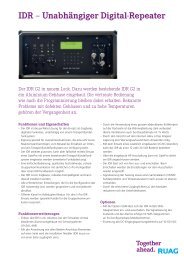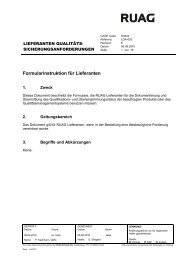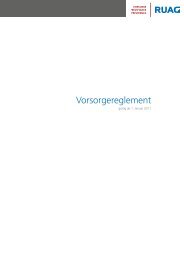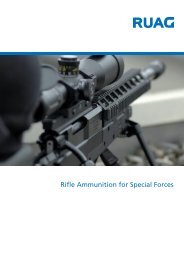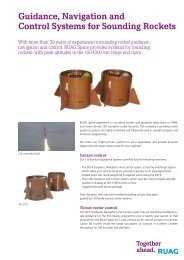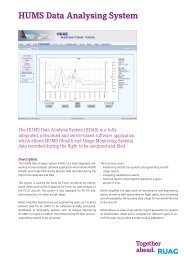Annual Report 2007 - RUAG
Annual Report 2007 - RUAG
Annual Report 2007 - RUAG
Create successful ePaper yourself
Turn your PDF publications into a flip-book with our unique Google optimized e-Paper software.
CORPORATE GOVERNANCE<br />
• Assessing the internal and external<br />
auditors<br />
• Establishing and approving the<br />
main elements of the audit<br />
• Acceptance of the audit report and<br />
any recommendations of the auditors<br />
prior to submission of the annual<br />
financial statements (individual<br />
and consolidated) to the full Board<br />
of Directors for approval<br />
• Submitting a proposal to the full<br />
Board of Directors regarding which<br />
external firm should be proposed to<br />
the annual shareholders' meeting<br />
for election as auditor and group auditor;<br />
assessing the service provided,<br />
remuneration and independence of<br />
the external auditors and examining<br />
the compatibility of audit activities<br />
with any consultancy mandates<br />
The Audit Committee regulates and<br />
monitors internal auditing. It provides<br />
the full Board of Directors with a regular<br />
report on its activities and immediately<br />
informs the Board of any<br />
important matters.<br />
Compensation Committee<br />
The Compensation Committee is<br />
composed of three non-executive<br />
members of the Board of Directors:<br />
Konrad Peter (Chairman), Hanspeter<br />
Käser and Hans-Peter Schwald.<br />
The Compensation Committee is responsible<br />
for personnel planning for<br />
the Executive Board and submitting<br />
nominations for vacant posts at this<br />
level to the full Board of Directors.<br />
The Committee is also charged with<br />
proposing the compensation package<br />
16<br />
for the members of the Board of Directors,<br />
remuneration policy for the<br />
members of the Executive Board and<br />
the emoluments of the members of<br />
the Executive Board to the Board of<br />
Directors. The Compensation Committee<br />
meets at least once a year.<br />
Information and controlling<br />
tools in relation to the<br />
Executive Board<br />
The Management Information System<br />
(MIS) of the <strong>RUAG</strong> Group is structured<br />
as follows: The subsidiaries' balance<br />
sheet, income statement and cash<br />
flow statement are compiled on a<br />
monthly, quarterly, semi-annual and<br />
annual basis. This information is consolidated<br />
for the various divisions and<br />
for the Group as a whole and compared<br />
to the budget. The budget,<br />
which represents the first year of a<br />
four-year plan for each subsidiary, is<br />
examined in the form of a feasibility<br />
forecast based on quarterly results.<br />
The Chief Executive Officer provides<br />
the Board of Directors with a monthly<br />
written report on budget compliance.<br />
Executive Board<br />
Management organization<br />
The Board of Directors has appointed<br />
an Executive Board under the<br />
chairmanship of the Chief Executive<br />
Officer. Its powers and duties are set<br />
out in the Regulations Governing<br />
Organization and Operations and in<br />
the description of the functions of the<br />
Chief Executive Officer. The Divisional<br />
Heads report to the Chief Executive<br />
Officer, who is responsible for over-<br />
all management and cross-divisional<br />
cooperation.<br />
The CEO, Divisional Heads, Head of<br />
Group Services, Chief Financial Officer<br />
and Head of Human Resources sit on<br />
the Executive Board (9 members).<br />
Chief Executive Officer<br />
The Chief Executive Officer manages<br />
the <strong>RUAG</strong> Group. He submits the<br />
<strong>RUAG</strong> Group's strategy, long- and<br />
medium-term objectives and management<br />
guidelines to the full Board<br />
of Directors for their approval.<br />
At the proposal of the Chief Executive<br />
Officer, the full Board of Directors<br />
decides the four-year corporate plan,<br />
annual budget, individual projects,<br />
individual and consolidated financial<br />
statements and human resources issues.<br />
At the request of the Chief Executive<br />
Officer, the Compensation<br />
Committee reviews the remuneration<br />
of the members of the Executive Board<br />
as well as insurance issues.<br />
The Chief Executive Officer regularly<br />
provides reports to the Board of<br />
Directors on business performance,<br />
anticipated business matters and<br />
risks, and also changes at the more<br />
junior management level. The members<br />
of the Board of Directors may<br />
request and examine additional information.<br />
The Chief Executive Officer<br />
must inform the Chairman without<br />
delay of any significant unexpected<br />
developments.<br />
The Chief Executive Officer regularly<br />
monitors whether the Articles of Association<br />
or the regulations and signatory<br />
powers issued by the Board<br />
A <strong>RUAG</strong> driving simulator during acceptance testing.




